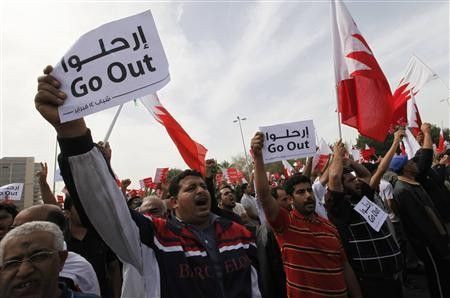Bahrain prince warns against protest escalation

Bahrain's crown prince warned all sides against escalating a standoff with disgruntled majority Shi'ites seeking an elected government in the Gulf Arab kingdom, asking for patience ahead of a national dialogue.
Bahrain suffered its worst unrest since the 1990s last month when seven people died in a heavy-handed security response to protests by Shi'ites who have long complained of discrimination in Sunni-ruled Bahrain, a close U.S. and Saudi ally.
Crown Prince Sheikh Salman bin Hamad al-Khalifa, tapped to lead a dialogue with the opposition, said the protests would continue to be allowed but must remain peaceful.
These rallies must not infringe upon the freedoms of other people. This is a basic principle. I urge all parties not to escalate matters or to slide into sensationalism. Some people do want this to happen, so we have to be fully committed and to speak out bravely against it, Sheikh Salman said.
I hope that everyone will be brave, patient and optimistic and motivated to engage actively in the dialogue, he told state television, according to a summary of the interview.
Bahrain's protesters have been largely peaceful, inspired by mass rallies that toppled the leaders of Egypt and Tunisia before sparking an armed insurrection in Libya and smaller protests in other Gulf states such as Oman and Saudi Arabia.
But tensions turned to clashes between Sunni and Shi'ite Muslims in Bahrain on Thursday, the first direct confrontation between the two communities since large scale protests erupted in the kingdom's main city last month.
Bahrain, home to the U.S. Navy's Fifth Fleet, is ruled by the Sunni al-Khalifa family and its majority Shi'ites have complained of discrimination in jobs, housing and social services. The government denies this.
The government has made some concessions after ordering troops off the streets under international pressure, but formal political dialogue has not yet started. Sheikh Salman said that dialogue should not have a predefined scope. No party should define the scope or purpose of the dialogue before we even start. It is important, very important, that we talk about these issues. We have no problem with talking about these issues and discussing them in depth, he said.
Around 70 to 80 per cent of the demands are shared by all the people. Everybody wants better services. Everybody wants dignity. Everybody wants to be heard. Everybody wants accountability, he added.
Bahraini opposition groups said last week they were ready to enter talks with the government without pre-conditions, but have sent a letter to the crown prince saying they wanted a new government and constitution.
Six political groups led by the main Shi'ite opposition group Wefaq want the resignation of the cabinet, a new constitution under which the government is elected and an investigation into the actions of the security forces.
They also seek guarantees that peaceful protests can continue and want state media to give them more coverage.
© Copyright Thomson Reuters 2024. All rights reserved.





















